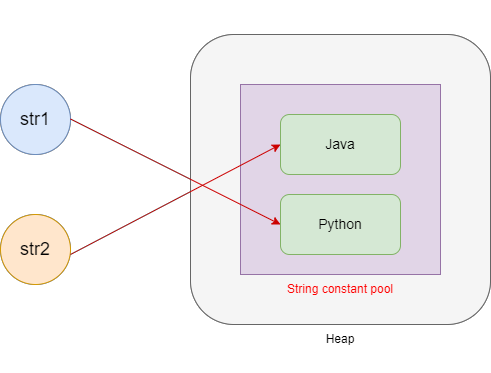Why Are Strings Immutable in Java? Safety and Efficiency Perks
Why Are Strings Immutable in Java? Safety and Efficiency Perks
Blog Article
Unalterable Strings: A Key Element in Ensuring Information Consistency and Dependability
In the world of data management, the value of immutable strings can not be overstated. These unvarying sequences of personalities play a crucial duty in upholding the honesty and precision of information within systems. By preserving a state of immutability, data consistency is made sure, cultivating a foundation of dependability whereupon critical procedures rely. The principle of unalterable strings goes beyond mere formality; it is a cornerstone in the facility internet of data governance. As we explore the benefits, implementation approaches, and practical applications of immutable strings, a clearer image emerges of their indispensable nature in protecting the electronic landscape.
The Concept of Unalterable Strings
Unalterable strings, an essential idea in programs, refer to strings that can not be changed as soon as they are created. Fundamentally, once a string value is assigned, any type of operation that shows up to customize the string really produces a new string. This immutability ensures data uniformity and reliability in applications, as it stops unforeseen changes to the initial data.
Benefits in Information Uniformity

Data uniformity is critical in numerous aspects of software program growth, including database management, multi-threaded settings, and distributed systems (Why are strings immutable in Java?). Unalterable strings contribute significantly to achieving this consistency by preventing information corruption due to concurrent access. In circumstances where several procedures or threads interact with the very same data at the same time, unalterable strings serve as a secure against race problems and synchronization problems
Moreover, the immutability of strings streamlines debugging and screening procedures. With immutable strings, designers can rely on that when a string is established, it will remain unmodified, making it much easier to trace the resource of errors and guaranteeing that examination situations create consistent results. This integrity in information dealing with ultimately causes more durable and stable applications.

Executing Immutable Strings
Making certain the immutability of strings requires a thoughtful strategy to their implementation in software development. One crucial approach is to create string classes in a method that stops modifications as soon as a string item is developed. By making strings unalterable, designers can improve information consistency and dependability in their applications.
To apply immutable strings effectively, developers should prefer creating new string items as opposed to customizing existing ones. This practice makes sure that once a string is designated a value, it can not be altered. Furthermore, any type of procedure that appears to customize the string must create a new string with the wanted changes rather than changing the initial.
In addition, making use of unalterable strings can streamline concurrency management in multi-threaded environments. Since immutable strings can not be transformed after production, they can be securely shared amongst numerous threads without the risk of information corruption.
Duty in Reliability Assurance
In software advancement, the application of unalterable strings plays a crucial duty in ensuring the reliability of information operations. Immutable strings, when produced, can not be changed, guaranteeing that the information they stand for stays consistent throughout the application's execution. This immutability property offers a degree of guarantee that the information being refined will certainly not be unintentionally transformed, leading to unforeseen outcomes or errors in the system.
By incorporating immutable strings right into software design, developers can improve the dependability their website of their applications by decreasing the threats connected with mutable data - Why are i was reading this strings immutable in Java?. Unalterable strings assist in stopping data corruption or unexpected alterations, which can be especially important when taking care of delicate details or when data integrity is paramount
Moreover, using immutable strings streamlines concurrent handling, as several threads can securely accessibility and share string information without the danger of one thread changing the material while another reads it. This facet adds dramatically to the general reliability of the software application system, ensuring regular and foreseeable actions in data handling operations.
Applications and System Assimilation
The seamless integration of unalterable strings into numerous applications and systems is critical for guaranteeing robust information uniformity and dependability throughout varied technical atmospheres - Why are strings immutable in Java?. Unalterable strings play a crucial role in boosting the stability of information exchanges and interactions within complex software application ecosystems. By incorporating immutable strings right into applications, developers can alleviate the risks related to data meddling, unauthorized modifications, and unintentional alterations, thereby strengthening the overall protection position of the system
In the context of system combination, immutable strings function as a fundamental aspect for establishing safe and secure communication channels and facilitating smooth data transfers in between various parts. Their immutable nature makes sure that data sent between systems remains proven and unchanged, minimizing the chance of variances or mistakes that could compromise the integrity of the whole system. Moreover, immutable strings can boost interoperability in between inconsonant systems by giving a standardized format for information representation, enabling much more effective information processing and exchange procedures across interconnected systems. By taking on unalterable strings in applications and system integration processes, companies can strengthen their data infrastructure and promote the dependability and uniformity of their info possessions.
Final Thought
In final thought, immutable strings play a crucial role in maintaining information consistency and reliability in numerous applications and system integrations. By ensuring that strings can not be transformed as soon as developed, the stability of data is maintained, lowering the risk this content of disparities and mistakes. Implementing unalterable strings can significantly enhance the reliability of systems, inevitably resulting in even more exact and reliable data processing.

Report this page